How to plant garlic?
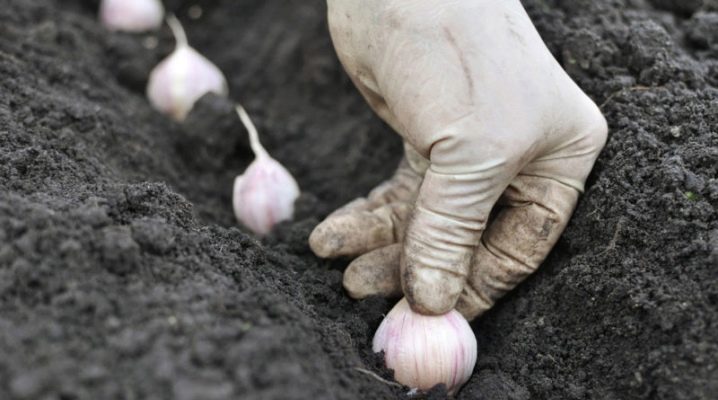
To harvest a rich harvest of garlic, you need to take into account a number of basic rules for planting this crop. In this article, we will look at the main points of its landing.
Timing
You can plant garlic twice a year. The spring species is best planted in the spring, the winter one is sown before winter. Planting time depends on the region, climatic conditions, varieties, favorable days. For example, according to popular beliefs, October 5 is a good time. If a winter crop is planted, it is best to do this about 2-3 weeks before the expected first frost. For different regions of the country, the interval varies from the end of September to October 10-14 (no later than the 20th).
Based on the timing of planting, there are 3 types of varieties. Early ripening ripens in 80-100 days. Mid-ripening - for 110-120 days, late - for 120-140 days. In Stavropol, Crimea and Kuban, it is recommended to plant the plant at the end of March until April 12-15. In the Urals and Siberia, you need to land it before the end of the third decade of May. The recommended time for planting garlic in the Moscow region, Moscow, Ivanovo, Vladimir regions is the first days of May. In the Leningrad Region, you can plant garlic until the end of May.
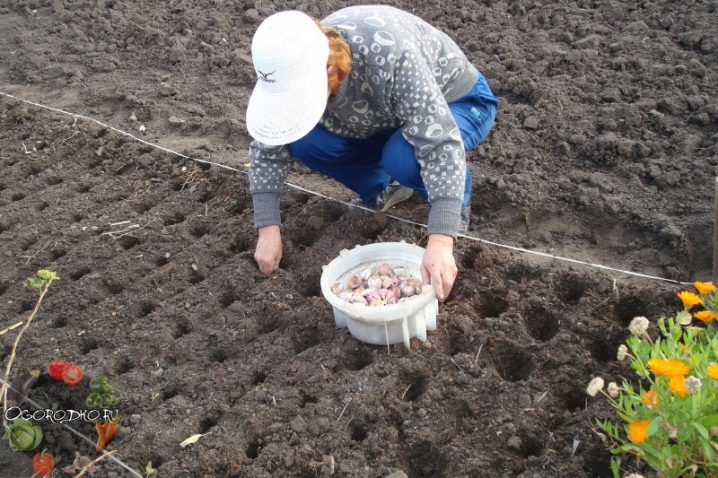
The root system must have time to grow. In this case, the plant will not freeze. Planting depths vary. For example, with an early planting before winter, it is enough to deepen the cloves into the ground by 3-5 cm. For better rooting in the regions of central Russia, the teeth are deepened by 10-15 cm. They need to be planted no later than the second decade of October. However, in areas with mild winters, planting is carried out after the first snow. In this case, no shelter is used. Subject to all planting rules, this will not affect the quantity and richness of the crop.
If the plant had time to sprout before winter, it will not die. If possible, it is necessary to sprinkle the sprouts with not yet frozen soil. For these purposes, mulch from the tops of plants from the last harvest is also used.
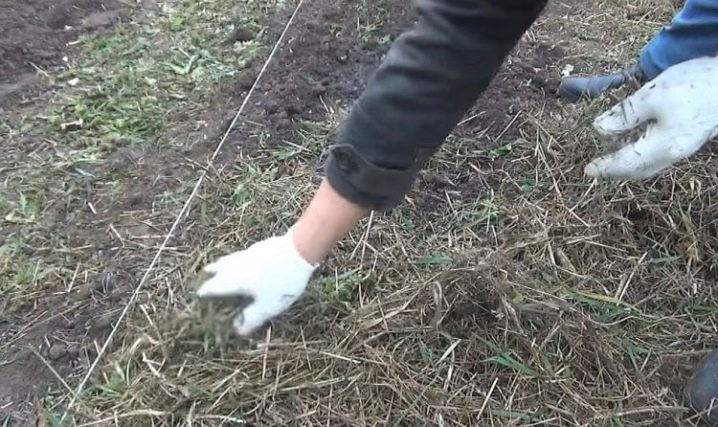
It is important to choose the right garlic for planting. Winter crops are larger and can consist of 4-12 large cloves arranged in 1 row around the stem. From above they are covered with a purple-pink film. It has a burning taste, it is not stored in winter, it is used for food, blanks, as a seed.
Spring garlic has no stem. Typically, the head contains up to 20-25 small teeth arranged in a spiral manner in several rows. Its taste is softer, it does not give arrows, it is stored all winter until spring. Spring garlic is cold-resistant, it is planted in the spring season, when the soil warms up to a temperature of +5 degrees. At this time, the time of spring frosts passed. The best dates are the last days of April or the beginning of May.
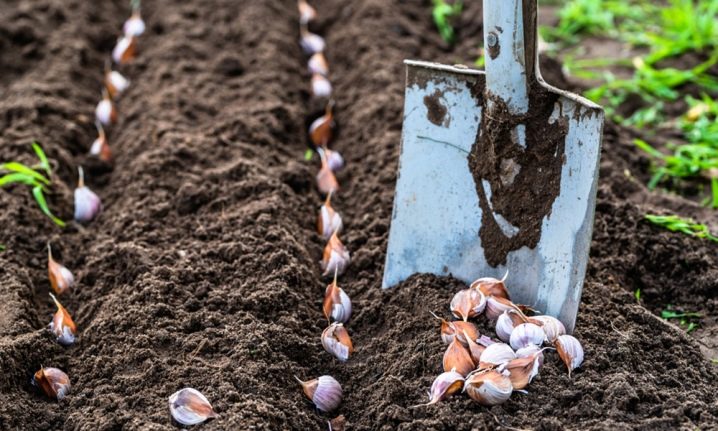
Seat selection
The ideal precursors for garlic are cucumbers and legumes. In addition to them, you can plant a crop in the beds where zucchini, pumpkin, early cabbage, and squash used to grow. Quite good predecessors are eggplants. The soil after harvesting these crops is replete with organic fertilizers. You cannot plant a plant where potatoes or onions were previously grown. This increases the likelihood of the exchange of diseases (for example, fusarium).
Winter garlic should not be planted where manure has recently been applied. Despite the rapid growth and powerful tops, the heads will grow loose, vulnerable to fungal infections. You should not plant a crop after carrots, celery, parsley. These plants extract soil potassium. Placing garlic next to strawberries is considered a positive neighborhood.The previous crop should be removed from the future garden no later than a month before planting winter garlic. This must be done in order for the soil to recover.
The best place for planting is a bed with fertile soil of optimal or low acidity. The place should be sunny, dry and well lit. The exposure is from north to south.
You should not plant the plant in places with a close location of groundwater or prone to spring floods.
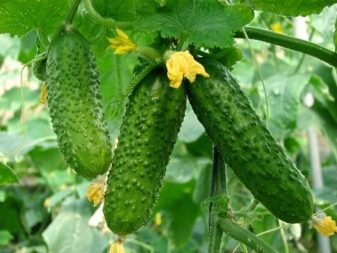
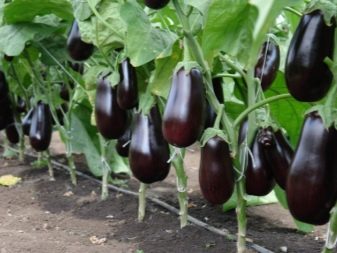
Preparation
Before planting garlic in the ground, you need to properly prepare the soil and select the seed. Both stages of work are simple, but have their own nuances.
Priming
Planting spring garlic requires early soil preparation. The optimal time is at the end of summer. To do this, you need to dig up the ground to a depth in the bayonet of a shovel. If necessary, you can loosen it with sand, peat, agroperlite. It is necessary to fertilize the earth with phosphorus-potassium fertilizing or humus, wood ash, chalk. 1 m2 requires 10 liters of humus, 0.25 kg of chalk, a couple of glasses of ash. It is best to apply fertilizer 1.5 months after the fall harvest. The width of the beds is no more than 1 m, the standard height is up to 25 cm. Over time and after watering, the soil will settle. The bed should not be low.
The preparatory stage includes processing the land from parasite larvae. To do this, use a 1% solution of copper sulfate, based on the calculation of 1 tablespoon per 10 liters of water. Spill the soil with the diluted preparation and cover with foil.
If there is no copper sulfate in the house, it can be replaced with potassium permanganate, Bordeaux liquid (0.1 kg per bucket of water), boric acid.
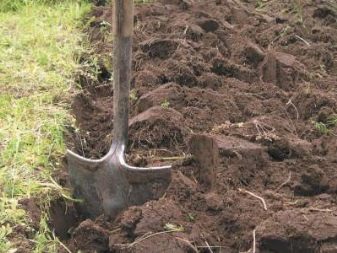

Do not plant garlic immediately after the formation of the garden. Due to the haste and subsidence of the soil, the teeth deepen even more. Therefore, in the spring they germinate longer. This reduces the yield of the crop. Before planting, you can treat the bed with urea, using no more than 20 g per 1 m2. After that, it is necessary to spill the earth with warm water.
In addition to the main method of soil preparation, there is another option that is in demand among gardeners. His initial work is similar to the previous one. First, you also need to dig up and fertilize the ground. Then it is spilled with warm water in order to sink the soil. After that, markings are performed for future planting. The row spacing is 35 cm, between the holes - no more than 10 cm. Peas, oats, mustard are planted in the row spacing. As they grow, they will act as a covering material. In the future, they will keep the snow layer, in the spring they will turn into an earth top dressing.
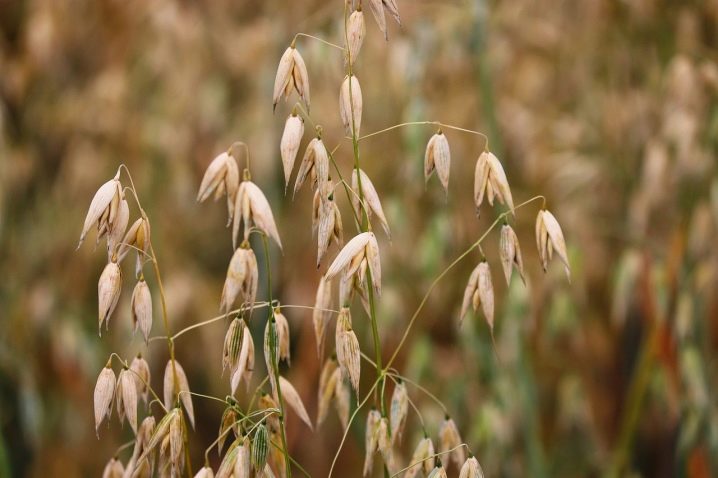
Planting material
For planting, the best, dense and healthy heads are selected. A month and a half before planting in open ground, they are placed on the lower shelf of the refrigerator or dripped into the snow. This manipulation will speed up the vegetative process. About a day before planting, the heads are removed and placed in a warm place.
After a visual inspection, the heads need to be cleaned, disassembled into separate teeth, and the soft white skin removed. Sorting is necessary because strong heads will not develop from small lobules. On average, the weight of a suitable clove is 4 g. The rejection of sluggish, doubled and shriveled slices is the prevention of degeneration of the vegetable culture.
When using planting material of varieties that do not give arrows, you need to take the teeth of the outer tier. Slices of the lower tiers are planted for greenery or simply eaten. In order for the seed to give a rich harvest, it must be disinfected. To do this, the cloves are soaked for 24 hours in a weak solution of copper sulfate or potassium permanganate.
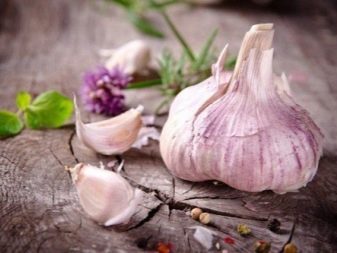
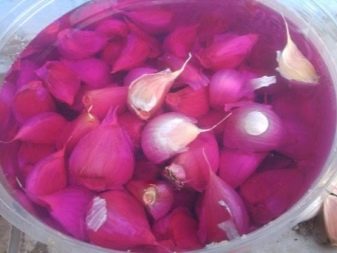
After that, the garlic can be planted before winter. Someone carries out etching from diseases and harmful parasites by treatment with a strong saline solution. Other gardeners use a weak solution of potassium permanganate. In order to stimulate growth, the seed can be soaked for 24 hours in different preparations. You can use "Epin", "Kornevin", "Zircon" and other nutritious liquids.
Before planting, the teeth are dried naturally in a ventilated area. Garlic does not need to be germinated beforehand. This is used when winter plant species are taken for spring planting. To do this, they are placed in a damp cloth or napkin. Then they are removed in a plastic bag and left for two or three days in a room at a temperature of +20 degrees.
Sprouted garlic can be planted in the ground. You can speed up the germination time by heating the slices in a water bath. The holding time is 7-8 hours at a temperature of +40 degrees.
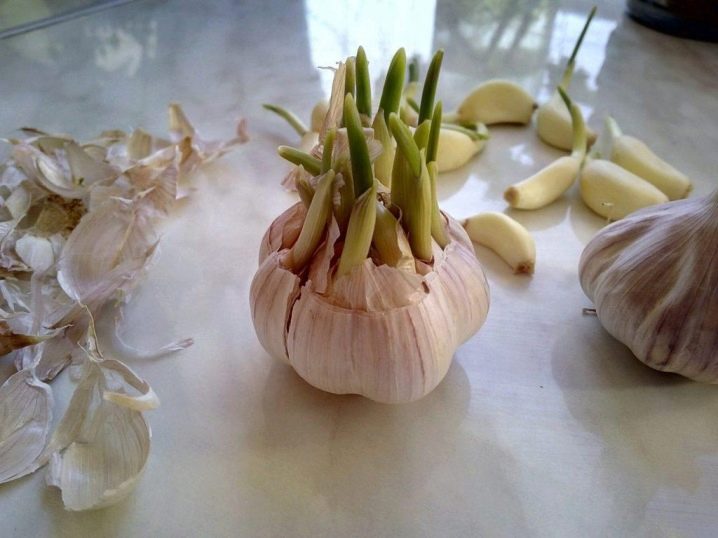
Planting methods
Cultivation techniques vary. In addition to the manual method, agricultural techniques can be used with different devices (for example, planters with a walk-behind tractor or other machines). Knowledge of the basic planting rules allows you to create comfortable conditions for the growth of tops and the formation of heads.
Separate slices
When choosing this planting method, the cloves are planted on a prepared and loosened bed. First, grooves are made at a distance of 15-20 cm from each other in each row. They are spilled with water, ash or sand is placed on the bottom. Then the cloves are planted with tails up to a depth of 6 cm.At the end of the work, sprinkle with a small humus layer.
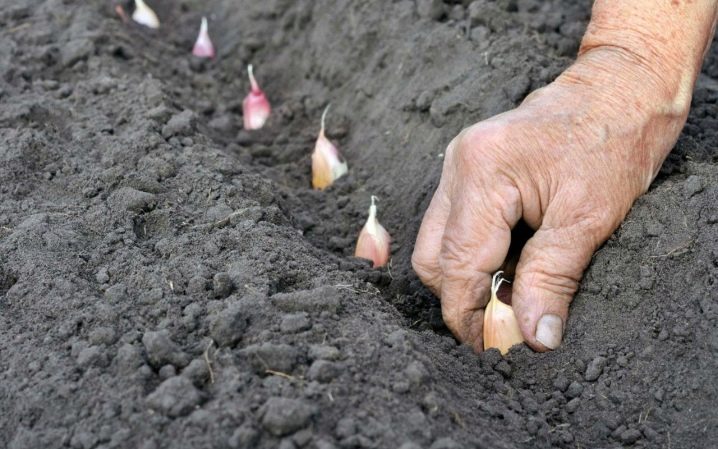
With the help of bulbs
Bulbules are seed material formed in the inflorescences of a winter plant. The planting scheme for winter sowing is as follows: grooves 3 cm deep are created in the garden bed every 10-15 cm. The bottom is treated with a weak manganese solution, sprinkling it on sand or ash. Then the seeds are placed at intervals of 3 cm with the bottom down. The garden bed is mulched with peat or compost.
Sevok is harvested when the tops turn yellow, and the neck is flaccid and thin. This is done in dry weather, always followed by drying at room temperature.
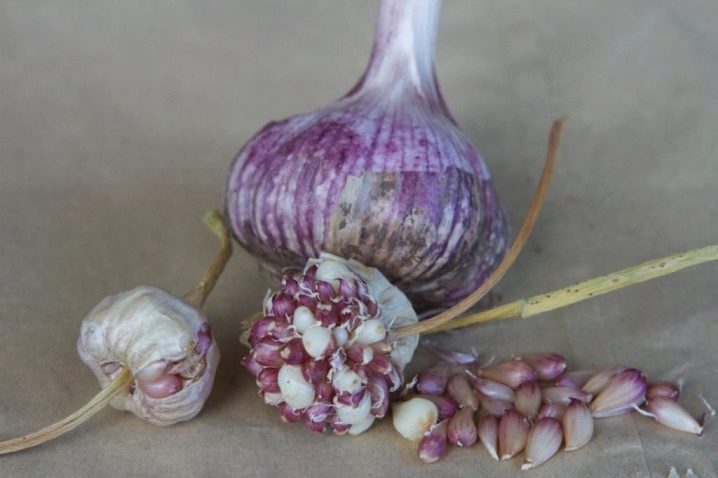
One-piece heads
The material is grown from bulbs at home or purchased at specialized points of sale. Visually, it resembles a medium-sized bow.
Whole single-toothed bulbs, called sevk, suggest planting before winter. The planting scheme assumes compliance with a distance of 20 cm between rows. The spacing between the bulbs must be at least 10 cm.
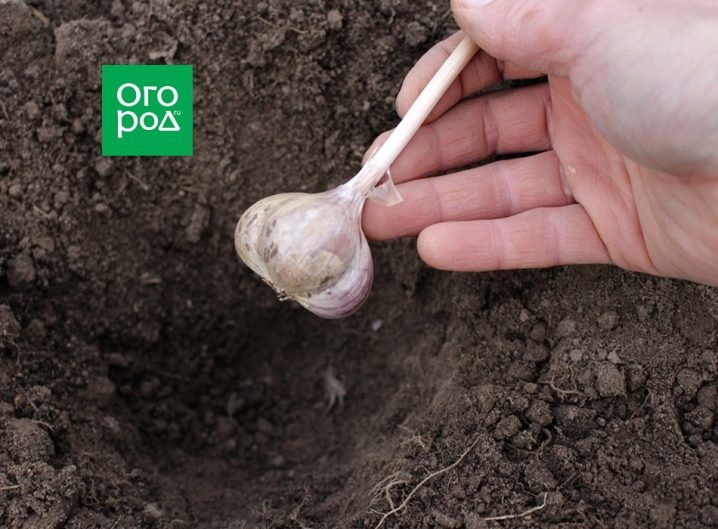
With a pipe
This technique is designed specifically to facilitate manual labor. According to her, for planting, a metal pipe with a diameter that is several times larger than the size of teeth or solid heads is needed.
The planter is immersed in the soil, retaining the earth and forming a hole. Prepared food is poured into it. Planting material is also placed there. After carrying out the manipulations, it is sprinkled with the excavated soil.
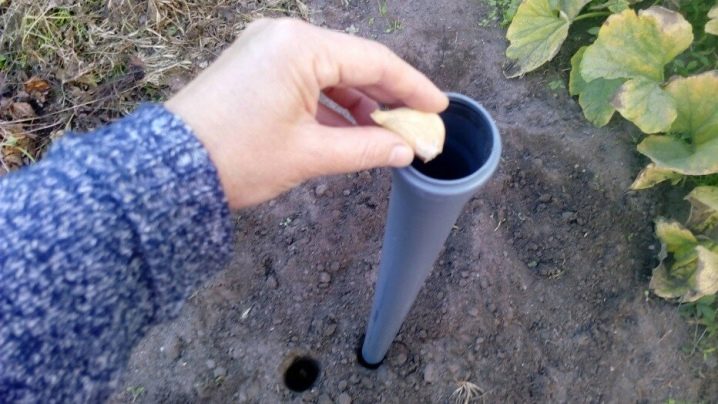
In two tiers
This technique is used when there is a shortage of landing space. Thus, the plants will not interfere with each other in growth and head formation.
For the lower tier, it is necessary to dig a hole deeply (at least 20 cm) and fertilize its bottom. Then a clove is planted, covered with earth on top and another 1 is planted at a depth of 10-13 cm.
With proper care, there will be one bush and two heads.
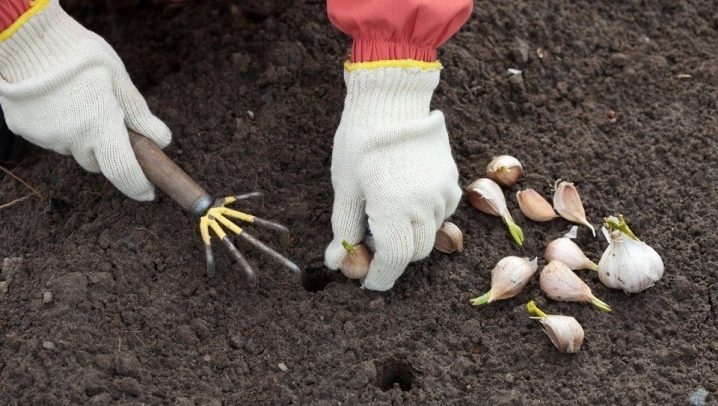
Follow-up care
After the garlic is planted, it is necessary to provide it with the most comfortable conditions for the growth and formation of large heads. It is important not to forget about timely watering, fertilization, shallow periodic loosening of the soil. It is necessary to get rid of weeds, carry out disease prevention and treatment from harmful insects.
Unlike winter garlic, spring garlic is picky about soil moisture. To provide him with proper care, it is worthwhile to properly organize the irrigation system. During the growth of roots and aboveground mass, water the garden bed at least 1 time in 5-6 days. The slightest drying out of the earth must not be allowed. Because of this, the bulbs will form one-toothed. Water the garlic using 1 bucket of water per 1 m2.
During the growing season, the plant needs moderate watering. The volume of water remains the same, the multiplicity changes. Now you need to water it once every 1.5-2 weeks.If it rains constantly at this time, watering is canceled. Excess moisture can cause diseases and rotting of the bulbous heads. About 4 weeks before harvest, artificial moisture is completely abandoned.
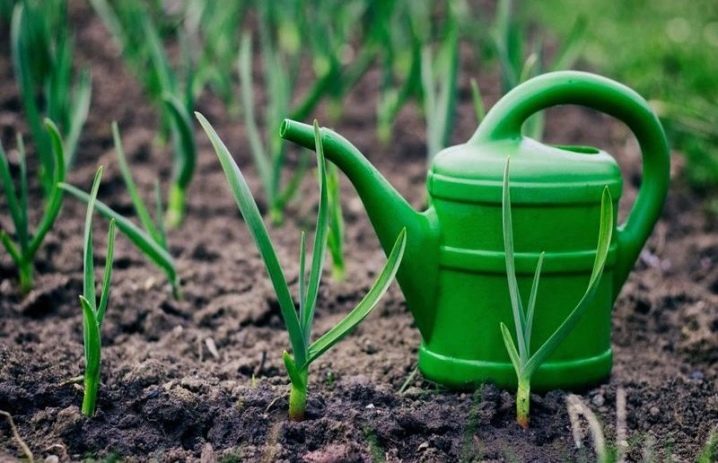
The first top dressing is applied a couple of weeks after planting the planting material. A growth-stimulating substance can be solutions on a nitrogen and potassium basis, herbal infusions, mineral preparations. The next top dressing is applied when the plant has already formed 5 true leaves. You can use wood ash diluted in water in a ratio of 150 g per 1 sq. m. Fertilizer is applied again after 10-12 days.
Until the heat is established, they resort to processing the culture with a diluted solution of ammonia. For this, 2 tablespoons of the substance are diluted in a bucket of water. This will prevent yellowing of the feather and will prevent fungal infections. If the summer is cold, the bulbs do not have time to ripen. To fix the problem, you need to collect feathers in bunches on August 13-15 and tie them in knots.
Thanks to this, growth will stop, there will be a redistribution of forces for the formation and maturation of the heads.
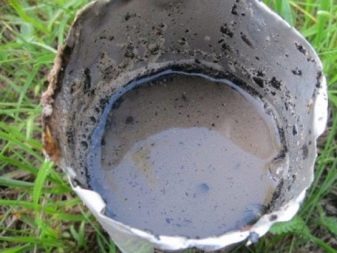

Useful Tips
There are different ways of planting garlic in open ground. There are 3 main types.
- With tape, 2 rows of cloves are placed in each tape. The spacing between the rows is about 20 cm, the distance between the ribbons should be at least half a meter.
- With a wide-row planting method, a strip sowing technique is provided. In this case, the teeth are laid in the ground in strips. The spacing between adjacent slices is about 6 cm. The row spacing should be about 40 cm.
- The number of rows in the bed method depends on the parameters of the bed. As a rule, several rows fit in it with an interval of at least 20 cm.In this case, the average values of the intervals between the planted slices are 15 cm.
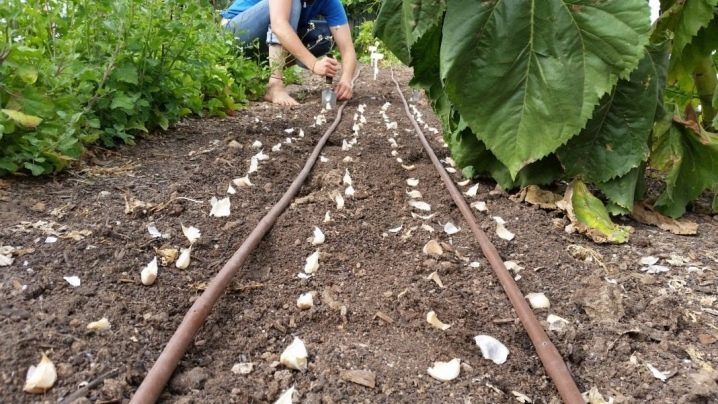
Determining the planting depth, take into account not only the variety and type of garlic, but also the size of the selected material. Small heads are planted to a depth of 8 cm. Large ones need to be deepened another 2 cm down. After planting, not only sawdust can be used as a covering material. Suitable materials can be dry peat or spruce branches, as well as dry grass. If plant stems are selected, seedless grass should be used. It will maintain the moisture level in the soil and become an excellent snow retention agent.
Winter garlic care must be correct. As soon as warm spring weather is established, it is necessary to remove sawdust, branches or other material from the garden with which it was covered for the winter. After that, you need to loosen the bed in the aisles. This will provide oxygen to the grown culture. You can water it without restrictions until July. Moderate watering will prevent decay of growing heads.
If garlic knocks out arrows and forms inflorescences, you need to get rid of them urgently. If this is not done, instead of forming bulbs, the forces of the plant will be directed to the development of bulbs.
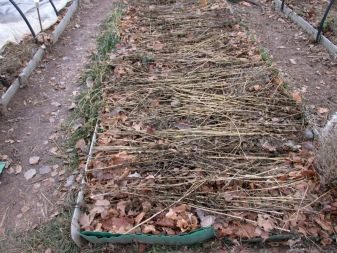
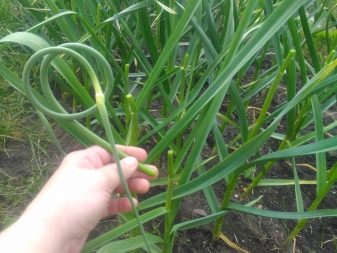













The comment was sent successfully.